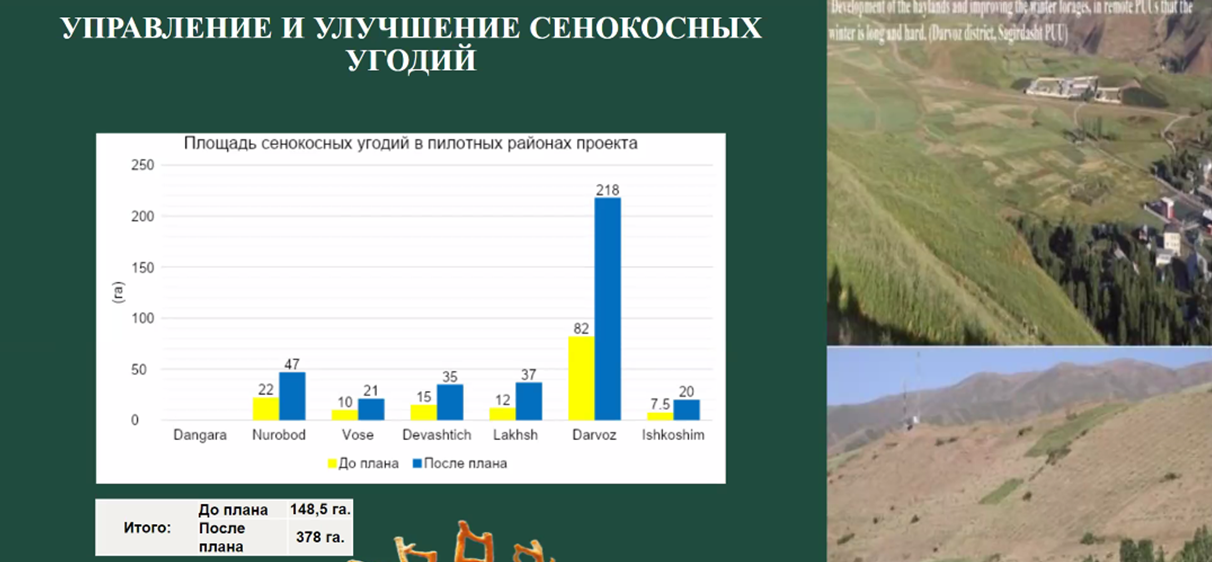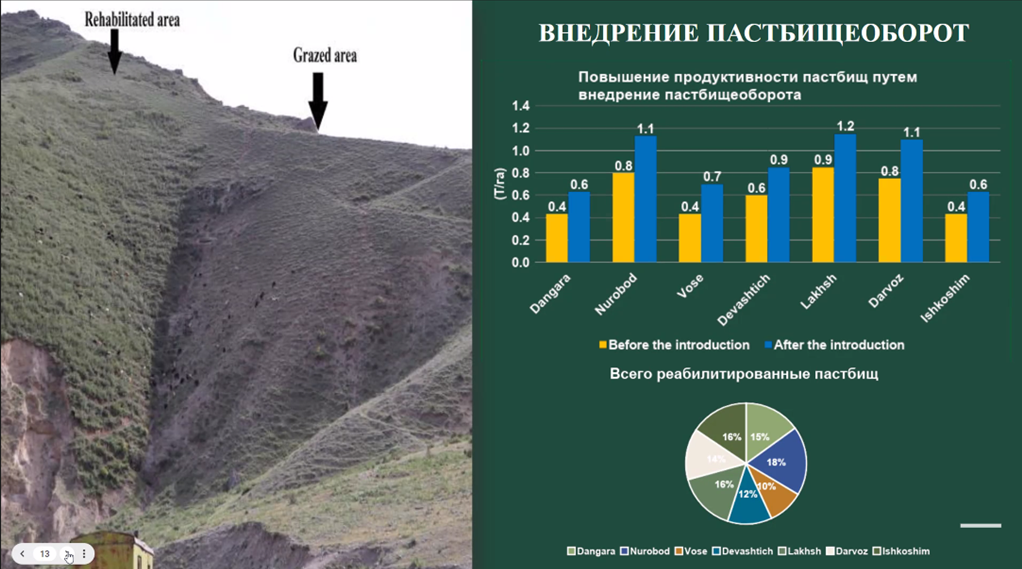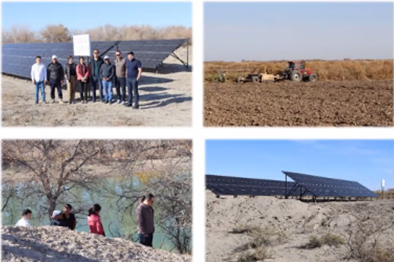The 4th meeting of the Regional Steering Committee (RSC) discussed the outcomes of the national components of the project “Climate Adaptation and Mitigation Program for Aral Sea Basin, Additional Financing (CAMP4ASB AF)” on March 5, 2024.
The Regional Environmental Centre for Central Asia (CAREC) implements CAMP4ASB AF in cooperation with the Executive Committee of the International Fund for Saving the Aral Sea (EC IFAS) under the financial support of the World Bank and the Green Climate Fund (GCF).
In 2024, the Republic of Tajikistan transferred the IFAS chairmanship to the Republic of Kazakhstan. In his opening speech, CAREC Executive Director Zafar Makhmudov congratulated Kazakhstan on its IFAS chairmanship, which will last until the end of 2026 and expressed deep gratitude to the Republic of Tajikistan.
Zafar Makhmudov stressed that 2024 takes stock of CAMP4ASB AF activities. CAMP4ASB AF will present its results at the Central Asia Climate Change Conference (CACCC-2024) on May 28-29 in Almaty, Kazakhstan. He emphasized the importance of the regional component consolidating the Central Asian countries and noted that it is the final meeting of the RSC.
The authorized representative of the Republic of Kazakhstan in EC IFAS, Serik Bekmaganbetov, praised the CAMP4ASB AF project, its important and useful initiatives and events for the region such as the annual Central Asia Conference on Climate Change, meetings of the Central Asian Foreign Ministries and parliamentarians, a joint Pavilion of Central Asia at the UNFCCC COPs.
Serik Bekmaganbetov noted that the project completed its tasks and achieved its goals. According to him, GCF additional funding gave an impetus to the project and enhanced its effectiveness. He expressed hope for continued and productive cooperation.
During the RSC meeting, representatives of the National Coordination Groups of Tajikistan and Uzbekistan presented the results of the national components of the CAMP4ASB AF project.
Tajikistan
Tajikistan implemented 119 subprojects aimed at adapting to climate change. It selected 8 pilot districts in the basins of three rivers: Vakhsh, Panj and Syrdarya. The pilot districts were chosen by the methodology of the Climate Change Adaptation Strategy.
The subprojects covered the most vulnerable to climate change areas: pasture management and livestock husbandry, improvement of degraded lands, and water resources management.
The CAMP4ASB AF project developed 18 pasture and livestock management plans and 18 water management plans implemented in 8 pilot districts.В
Thus, the plans increased the area of hayfields in the Darvoz district from 82 hectares to 218 hectares. In general, the hayfield productivity improved from 148.5 hectares to 378 hectares in 8 pilot districts.

The introduction of pasture rotation raised pasture productivity by 18% in Nurobod, 16% in Lakhsh and Ishkoshim, and 15% in Dangar

Subprojects improving the condition of degraded lands increased their yield from 0.6 t/ha to 0.9 t/ha.
As noted, the subprojects participants served as an incentive for other farmers and rural residents, who have already begun to preserve and restore degraded lands based on the subprojects experience.
Besides, new gardens were planted on the sloped lands. 9,400 fruit-bearing seedlings and 400 seedlings of paulownia, known for its low-flammability properties and fastest growth, were planted.
Ongoing livestock husbandry subprojects reduced the number of low-productive local livestock breeds and relieved the burden on pastures by diminishing the livestock number, rationalizing fodder resource distribution, increasing livestock productivity and improving the beneficiaries’ food security.
The beekeeping subprojects gave jobs to more than 200 women, of which 30% have children with disabilities, and had a positive impact on the well-being of their families.
Poultry subprojects provided 1890 turkeys to residents of 6 villages of Dangara and Lakhsh districts. The turkey population increased to 10,115 with a total income of over $10,000.
The subprojects on pasture management and livestock husbandry, and the improvement of degraded lands resulted in boosting the productivity of 378 hectares of haymaking area and restoring 42, 700 hectares of grasslands. Pasture productivity increased by 40%, grass cover - by 30%, livestock productivity - by 30%.
Besides, the subprojects provided farm equipment: 82 units of machinery and 513 units of equipment, including excavators, tractors, backhoe loaders, walk-behind tractors, trailers, mowers and sprayers.
The farm equipment improved 1,553 km of irrigation systems and helped clean over 340 km of collector and drainage networks.
Water management subprojects ensured more than 26,000 people with clean drinking water, and drilled 11 wells to irrigate over 430 hectares of land. In addition, a drip irrigation system was installed on sloped or eroded lands improving their reclamation condition and decreasing water erosion whereby yield rose while water and land resources were saved.
The total number of direct and indirect beneficiaries of the subprojects was 80,993, of which over 40,000 were women.
Uzbekistan
285 subprojects in Uzbekistan covered 46 districts in Karakalpakstan, Khorezm, Bukhara and Navoi regions. It encompassed over 6,000 beneficiaries, of which over 3,000 were women. The subprojects created 1,785 new jobs, of which 830 were for women.
Uzbekistan subprojects focused on the introduction of climate-resilient technologies and crops.
 Beneficiaries of a subproject in the Kungrad district of the Republic of Karakalpakstan use solar panels to grow an orchard. Solar panels power 3 water pumps to irrigate the garden. Currently, they dug a 30-meter water well and installed a drip irrigation system pump and a water purification filter. They planted seedlings of Sogdian Beauty apple and Forest Beauty pear trees.
Beneficiaries of a subproject in the Kungrad district of the Republic of Karakalpakstan use solar panels to grow an orchard. Solar panels power 3 water pumps to irrigate the garden. Currently, they dug a 30-meter water well and installed a drip irrigation system pump and a water purification filter. They planted seedlings of Sogdian Beauty apple and Forest Beauty pear trees.
Solar panels are also used to grow fodder for livestock in the Bozatov district of the Republic of Karakalpakstan. The subproject grows sorghum and alfalfa on 40 hectares and irrigates them with a water pump powered by solar panels.
Subprojects created greenhouses of 0.01 hectares for 32 households in the Kanimekh district of the Navoi region. Greenhouses serve as a source of extra money for low-income families.
Subprojects in Tajikistan and Uzbekistan can become examples of effective adaptation to climate change.
RSC meeting decided to meet as necessary and start preparing for the project’s final assessment, as well as to demonstrate the CAMP4ASB AF results at CACCC-2024.
Additional information:
Dilovarsho Dustzoda – Coordinator of the Regional Coordination Group (RCU), Climate Change and Sustainable Energy Program Manager/Project Coordinator CAMP4ASB AF, recath_manager@carececo.org
